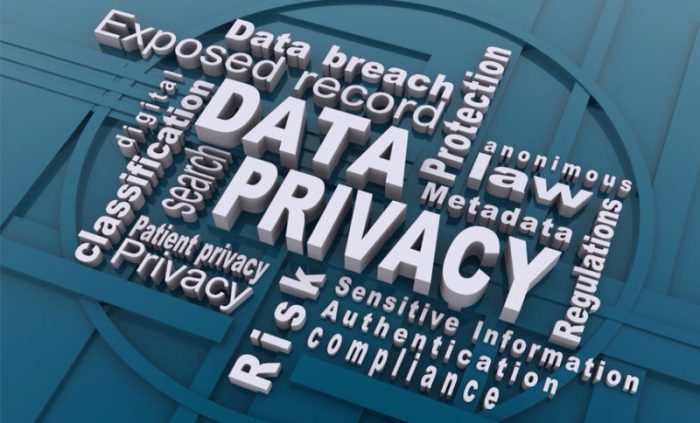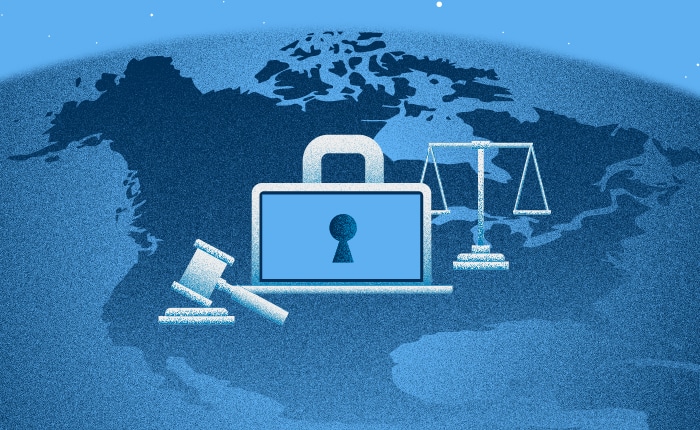Diving into Understanding Data Privacy Laws, this intro hooks you in with a fresh take on safeguarding your online info. From the basics to the nitty-gritty, get ready to explore data protection like never before.
Overview of Data Privacy Laws

In today’s digital age, data privacy laws play a crucial role in safeguarding individuals’ personal information from misuse, unauthorized access, and breaches. These laws aim to regulate the collection, storage, and processing of data by organizations to ensure transparency, accountability, and protection for data subjects.
Key Components of Data Privacy Laws
- Consent: Data privacy laws require organizations to obtain explicit consent from individuals before collecting or using their personal data.
- Data Protection: These laws establish guidelines and security measures to safeguard personal data from unauthorized access, disclosure, or alteration.
- Breach Notifications: In the event of a data breach, organizations are mandated to notify affected individuals and relevant authorities to mitigate risks and prevent further harm.
Comparison of Data Privacy Laws Across Different Countries or Regions
Various countries and regions have enacted their own data privacy laws with unique provisions and requirements. For example:
| Country/Region | Key Data Privacy Laws |
|---|---|
| United States | General Data Protection Regulation (GDPR) |
| European Union | California Consumer Privacy Act (CCPA) |
| Canada | Personal Information Protection and Electronic Documents Act (PIPEDA) |
General Data Protection Regulation (GDPR)
The General Data Protection Regulation (GDPR) is a comprehensive data privacy law that was implemented in the European Union to protect the personal data of individuals. It applies to businesses operating within the EU or those that process the data of EU residents.
Overview of GDPR
- Businesses need to obtain explicit consent before collecting personal data.
- Individuals have the right to access their data and know how it is being used.
- Companies must ensure the security and confidentiality of personal data.
Rights of Individuals under GDPR
- Right to access: Individuals have the right to request access to their personal data held by a company.
- Right to be forgotten: Individuals can request the deletion of their personal data if it is no longer necessary for the purpose it was collected.
- Right to data portability: Individuals can request their data to be transferred to another service provider in a commonly used format.
Consequences of Non-Compliance with GDPR
- Financial penalties: Companies that fail to comply with GDPR can face fines of up to €20 million or 4% of their global annual turnover, whichever is higher.
- Reputation damage: Non-compliance can lead to loss of customer trust and reputation damage, impacting future business opportunities.
- Lawsuits and legal actions: Individuals affected by data breaches or privacy violations can take legal action against non-compliant companies.
California Consumer Privacy Act (CCPA): Understanding Data Privacy Laws

The California Consumer Privacy Act (CCPA) is a state statute that enhances privacy rights and consumer protection for residents of California. It was enacted to give consumers more control over their personal information and require businesses to be more transparent about their data collection and sharing practices.
Key Provisions of CCPA
- Right to Know: Consumers have the right to request information about the personal data collected, disclosed, or sold by a business.
- Right to Delete: Consumers can request the deletion of their personal information held by a business.
- Opt-Out Rights: Consumers have the right to opt out of the sale of their personal information.
- Non-Discrimination: Businesses cannot discriminate against consumers who exercise their privacy rights.
CCPA vs. GDPR
The CCPA and GDPR share similar objectives in protecting consumer data privacy, but there are key differences in their scope and requirements. While the GDPR applies to all businesses that process EU residents’ data, the CCPA is specific to businesses operating in California and collecting personal information of California residents. The CCPA focuses more on transparency and consumer control, while the GDPR emphasizes data security and accountability.
Implications of CCPA on Businesses in California, Understanding Data Privacy Laws
- Compliance Costs: Businesses may incur significant costs to comply with the CCPA, such as implementing new data protection measures and systems.
- Operational Changes: Businesses may need to adjust their data collection and sharing practices to align with CCPA requirements, which could impact their operations.
- Legal Risks: Non-compliance with the CCPA can result in fines and legal consequences, leading to reputational damage for businesses.
Data Processing and Consent
In the world of data privacy laws, understanding data processing and consent is crucial to ensure the protection of personal information.
Data Processing Explained
Data processing refers to any operation performed on personal data, such as collection, storage, use, and sharing. It is essential to have a lawful basis for processing personal data to ensure compliance with data privacy laws.
- Lawful Bases for Processing Personal Data:
- 1. Consent: Individuals give explicit permission for their data to be processed.
- 2. Contractual Necessity: Processing data is necessary for fulfilling a contract with the individual.
- 3. Legal Obligation: Processing data is required to comply with legal obligations.
- 4. Legitimate Interests: Processing data is necessary for legitimate interests pursued by the data controller.
Importance of Obtaining Consent
Obtaining consent for data processing activities is crucial to ensure that individuals have control over their personal information and how it is used. Consent should be freely given, specific, informed, and unambiguous to be valid under data privacy laws.
Obtaining valid consent is essential to build trust with individuals and demonstrate compliance with data privacy regulations.
Data Breach Response
In the unfortunate event of a data breach, organizations must act swiftly and decisively to mitigate the impact and protect sensitive information.
Importance of Timely Reporting
Timely reporting of data breaches is crucial to minimize the damage caused by unauthorized access to data. Delayed reporting can lead to further exploitation of vulnerabilities and increased risk for individuals affected by the breach.
- Notify affected individuals as soon as possible to take necessary precautions.
- Inform regulatory authorities promptly to ensure compliance with data privacy laws.
- Implement security measures to prevent future breaches and strengthen data protection protocols.
Best Practices for Data Breach Response
Organizations can follow these best practices to effectively respond to data breaches and mitigate potential risks:
- Conduct a thorough investigation to determine the scope and cause of the breach.
- Contain the breach by isolating affected systems and limiting further access.
- Notify affected individuals, regulatory authorities, and other stakeholders in a clear and transparent manner.
- Provide support and resources to affected individuals to help them navigate the aftermath of the breach.
- Review and update security protocols to prevent similar incidents in the future.